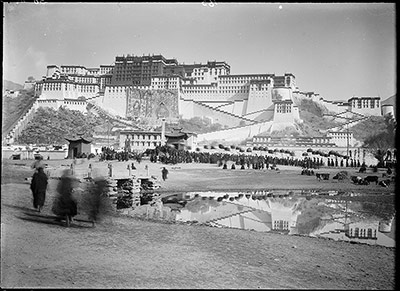
1998.285.188.1 (Glass negative)


1998.285.188.1 (Glass negative)

Rabden Lepcha?
Sir Charles Bell
April 8th 1921
Lhasa > Potala (from south) >
1998.285.188.1
120 x 163 mm
Negative glass plate gelatin , Negative Half Plate
Donated 1983
St Antony's College, Oxford.
Lantern
Sir Charles Bell's Mission to Lhasa 1920-21
Royal Central Asiatic Society
Rabden Lepcha?
Incorrectly listed in Bell's notes under H.163
BL.H.165
Bell's List of Illustrations entry for H.165: "[No. of chapter] XXX. [Subject of Chapter] Arts and Crafts. [Subject of Illustration] H.163 [sic] (m) Gigantic pictures, embroidered in silk, of the present and coming Buddhas at Ser-treng cermony. The two pictures are on the walls of the Potala, and are some three hundred years old. Procession of monks (middle distance, right) passing round the base of the Potala Hill. See Diary IX, p.86."
Other Information - Description: Bell's diary entry for 8th April 1921: "We leave our house in De-kyi Ling-ka at 7.30a, to see the ceremony known as 'The Golden Rosary' (Ser-treng). The name is taken from the procession of monks in single file carrying banners of Victory (Gyal-tshen) and other emblems as offerings to the 5th D[alai] L[ama]. ... We are taken to a flat-topped tent open, in front, and erected on the roof of a house below the Potala. On the wall of the Potala are two gigantic pictures, worked in silk embroidery (applique work); the larger of the two is to the right about 80ft high by 90ft broad, a picture of "King Love" (Gye-wa Champa). This is perhaps the largest picture in the world. The picture to the left is 80 feet high by 70 feet broad and is of Gotama Buddha. Both pictures are several hundred years old; the Tsendron says that they date from the time of the 5th D[alai] L[ama]. In the topmost storey of the [?] Palace (Potrang Mar-po) the yellow silk curtains indicate the room from which the D[alai] L[ama], if he comes will watch the ceremony. Below us is a large open space, 50 yards square, on the roof of a house; on the left side of it is the usual tent for the Councillors, Dukes, Dzasas and Techis and in front of this tent, just below us, the performances take place. // Soon a procession of monks in single file is seen from the direction of the Tsuk Lakang winding along slowly in single file. Each carries on a long pole a Banner of Victory. They are monks from Sera, Drepung, Ganden and other monasteries in the area of Lhasa." [Diary Vol IX, pp.86-7]
Other Information - Photographer: This photograph was probably taken by Rabden Lepcha, or a photographer other than Bell, as Bell describes in his diaries being seated near the Potala in a tent on the roof of a house during this ceremony. [MS 4/6/2004]
Other Information - Cultural Background: The Sertreng, or Golden Procession, in which hundreds of monks march around the Potala Palace is one of the key religious ceremonies of the second month of the Tibetan calendar. The idea for this event is said to derive from a vision of the fifth Dalai Lama who imagined a golden rosary surrounding the palace he had built. The massive fabric Buddha images were stored in the Potala and only revealed to the public on the occasion of Sertreng. [CH, 03/04/2000]
For Citation use:
The Tibet Album.
"Potala with silk banners during Sertreng procession"
05 Dec. 2006. The Pitt Rivers Museum.
<http://tibet.prm.ox.ac.uk/photo_1998.285.188.1.html>.
For more information about photographic usage or to order prints, please visit the The Pitt Rivers Museum.
© The Pitt Rivers Museum